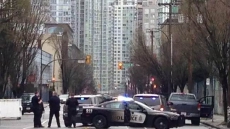OTTAWA — Western allies' support for Canada in its argument with China over the arrests of two Canadians on national-security grounds have made China "very dissatisfied," its foreign ministry said Monday.
Spokeswoman Hua Chunying said the detention of Huawei Technologies' chief financial officer is a much bigger international offence than China's own arrests of two Canadians, including a former diplomat.
After Meng Wanzhou was arrested in Vancouver on an American extradition warrant, Chinese authorities picked up researcher and analyst Michael Kovrig, who is on leave from Canada's foreign service to work for the anti-war International Crisis Group, and businessman Michael Spavor, who arranges exchanges with North Korea.
In the last few days, officials from the United States and Europe have joined Foreign Affairs Minister Chrystia Freeland's complaints about the arrests. Saturday, for the first time, Freeland directly demanded that China release the two.
U.S. State Department spokesman Robert Palladino called for their freedom on Friday. British Foreign Secretary Jeremy Hunt said he was deeply concerned about a political motive for their arrests. A statement from the European Union said the national-security claim "raises concerns about legitimate research and business practices in China."
Germany and France have issued similar statements.
Hua suggested Canada's allies were being hypocrites and should turn their attention to Meng's detention.
"Where were their voices when the senior manager of the Chinese company was illegally detained by the Canadian side at the behest of the U.S. side?" Hua asked in a regular briefing at the Chinese foreign ministry, whose transcript is posted in English to the ministry website.
"It is quite obvious that the human rights they are talking about have different standards when it comes to citizens of different countries."
Sources familiar with Kovrig's situation say he is been held without access to a lawyer, in a cell with the lights on around the clock, and questioned three times a day. Hua said Kovrig and Spavor's rights are being respected in Chinese custody and Canadian diplomats have been allowed to see them, as Global Affairs Canada has confirmed.
Hua says Canada should "correct its mistakes" and free Meng.
Meng is currently out of custody on $10 million bail, staying at a house in Vancouver and not allowed to leave the country.
The U.S. wants her to face fraud charges over allegations she lied to American banks in an effort to get around Iran sanctions; law-enforcement officials asked Canada to detain her when she passed through Vancouver on her way to Mexico.
However it ends up, the extradition process could take years.
"Canada cannot stop talking about its so-called legal obligations under its bilateral extradition treaty with the U.S.," Hua said. "Does that mean it can turn a blind eye to and trample on the basis norms (sic) of international law and international relations?"
Hua also took a question about a third Canadian, Albertan Sarah McIver, who has reportedly been detained in China over a visa problem. Canada has said it doesn't believe her arrest is related to the other two.
Asked when McIver will be deported, Hua said: "The competent Chinese authority will deal with it in accordance with law." Hua said last week that McIver had been sentenced to an administrative punishment, without specifying what that meant.
A timeline of the cases of Meng Wanzhou and the Canadians detained in China
OTTAWA — A timeline of the Meng Wanzhou case, and rising tension between Canada and China.
Aug. 22: A New York court issues a warrant for the arrest of Huawei Technologies chief financial officer Meng Wanzhou.
Dec. 1: Canadian authorities arrest Meng at Vancouver's airport while she is en route from Hong Kong to Mexico, after an extradition request from the Americans. The news becomes public on Dec. 5.
Dec. 6: China demands Canada release Meng and "immediately correct the mistake'' officials made in arresting her. The Chinese also say they were not briefed on the reasons for Meng's arrest.
In Ottawa, Prime Minister Justin Trudeau says Meng's case is part of an independent legal process with no outside political influence.
Dec. 7: Foreign Affairs Minister Chrystia Freeland says Canada's envoy to China has briefed Chinese officials about Meng's case. She declines to comment on suggestions from analysts and former diplomats that China will likely retaliate by jailing Canadians.
In Vancouver, Meng appears in court, where allegations of fraud are laid out. The U.S. alleges Meng misled American banks in a bid to get around American sanctions on Iran.
Dec. 8: Canada's ambassador to China, John McCallum, is summoned to a meeting with China's assistant foreign minister so the country can register complaints about Meng's arrest. "China strongly urges the Canadian side to immediately release the detained Huawei executive ... or face grave consequences that the Canadian side should be held accountable for,'' the assistant minister, Le Yucheng, says in a statement.
Dec. 9: China summons the American ambassador to China to lodge similar complaints about Meng's case and demand the U.S. rescind the order for her arrest.
Dec. 10: Chinese authorities arrest two Canadian men. Michael Kovrig, who was on leave from Global Affairs Canada, and entrepreneur Michael Spavor. Kovrig's arrest becomes public on Dec. 11. Spavor's becomes public on Dec. 12.
Meanwhile, China's vice premier, with responsibility for the domestic economy, and U.S. Treasury Secretary Steven Mnuchin talk about the ongoing tariff battle between the two countries.
Dec. 11: In the morning, Kelly Craft, the U.S. ambassador to Canada, tells reporters it is "absolutely false'' to assume a political motive behind the Meng's arrest.
Later in the day, Meng is released on $10 million bail. In an affidavit submitted for a bail hearing, Meng, 46, details a lifetime of health issues, including thyroid cancer, sleep apnea and high blood pressure.
The day ends with U.S. President Donald Trump telling Reuters in an interview that he would "certainly intervene'' in Meng's case "if I thought it was necessary'' to help forge a trade deal with China.
Dec. 12: China's foreign ministry says it has no information about Kovrig, but says the organization he worked with — the International Crisis Group — was not registered in China, making its activities in the country illegal.
The Liberals spend the day outlining how the extradition process will work, reiterating that it is an independent process. Trudeau reaffirms Canada's commitment to the rule of law, "regardless of what goes on in other countries.'' Justice Minister Jody Wilson-Raybould says she takes her "extradition responsibilities and obligations very seriously'' and that the final decision on extraditions lies with her.
Freeland warns any comments made in the United States could be used by Meng's lawyers before Canadian courts, which would have to judge their relevance in deciding whether to follow through on the American extradition request.
Dec. 13: Conservative Leader Andrew Scheer accuses Trudeau of taking a "naive approach'' to China, leaving Canada without "the leverage that we might otherwise have'' to resolve the situation. He calls on Trudeau to reach out to the highest levels of the Chinese government.
Earlier in the day, Trump's trade adviser, Peter Navarro, says the arrests of the two Canadians were plainly a response to Meng's arrest: "That's the Chinese playbook and again the problem we always have with China is when we launch legitimate concerns over whatever it is, China comes back and does these kinds of actions.''
China's foreign ministry says Kovrig and Spavor have been detained on suspicion of "endangering national security.''
Dec. 14: Canadian officials are granted consular access to Kovrig, and McCallum meets with him in Beijing. Meng's case comes up during a meeting between Freeland and U.S. Secretary of State Mike Pompeo, with the two agreeing that no politics be injected into the extradition process. Pompeo publicly calls on China to release Kovrig and Spavor.
In an interview with The Canadian Press, Trudeau says Canada will shortly be granted consular access to Spavor.
Dec. 16: Canadian diplomats in China are granted consular access to Spavor.
Dec. 19: Global Affairs Canada says a third Canadian has been detained in China. Prime Minister Justin Trudeau says the government has no reason to believe the case is linked to the detention of Kovrig and Spavor. The next day, China's Foreign Ministry spokeswoman Hua Chunying says the Canadian woman, Sarah McIver, received an administrative penalty for illegal employment.
Dec. 20: Indictments unsealed in the United States allege two Chinese citizens targeted companies in Canada and around the world as part of a years-long hacking campaign to steal data.
Dec. 21: Kovrig's employer, the International Crisis Group, says he has not been given access to a lawyer while in custody. A source familiar with the conditions of Kovrig's detention says he is questioned three times a day and kept in a room with the lights on continuously.
Freeland formally demands both men be let go, calling in a statement "for their immediate release." Similar statements come out from the United States, Britain and the European Union.
Dec. 22: During a visit to Canadian peacekeepers in Mali, Trudeau says countries around the world are "extremely disturbed" by China's detention of Spavor and Kovrig.
Dec. 24: China's foreign ministry calls out the U.S., Britain and EU, saying the trio should be condemning Canada for Meng's arrest. Spokeswoman Hua Chunying says Canada should "correct its mistakes" and stop acting at the behest of the United States. She says Kovrig and Spavor's rights are being respected while in custody.


